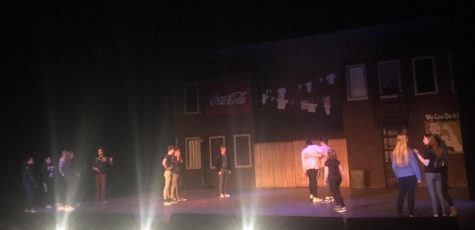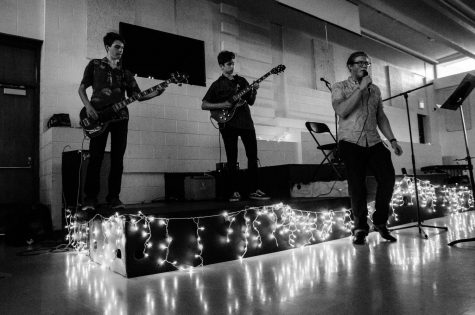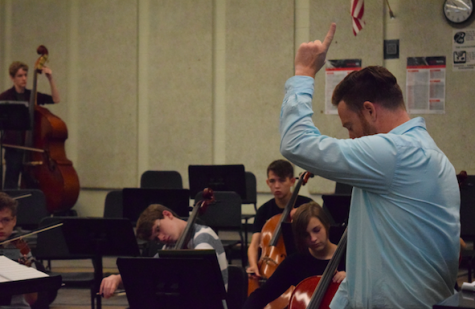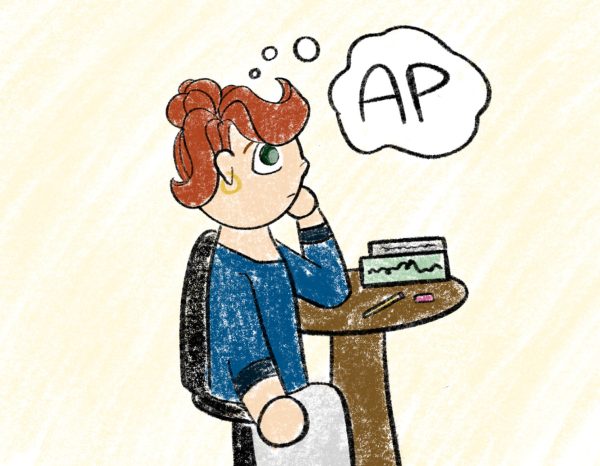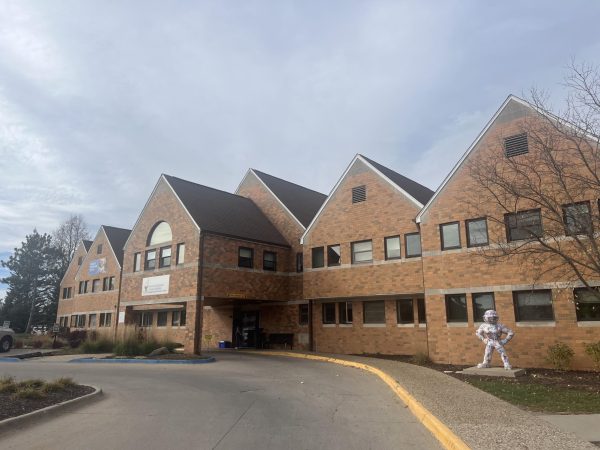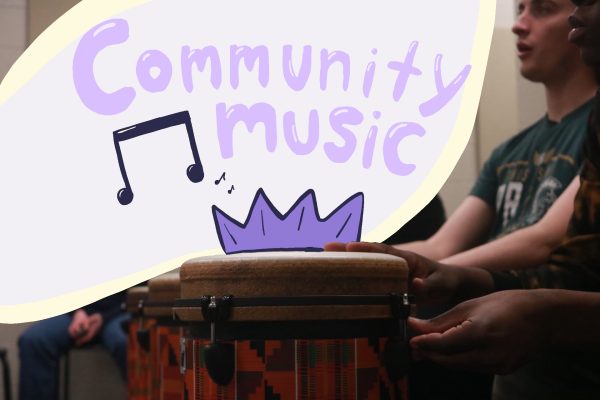Continuing their passion
Seniors have many essays, forms, and interviews they must prepare for college admissions and scholarships. But some West High seniors have other assignments they must do. Five students share their experiences of college music auditions in order to help future seniors.
Coming up soon
After seven years on the alto saxophone and three years on the tenor, Dominic Weston ’18 signed up for an audition at the University of Northern Iowa. And then he forgot the date.
“I had [to do] two classical pieces and memorize three jazz pieces. I signed up for the beginning of February and then in January I was like, ‘That’s really soon, so maybe I will push it back because they have another day.’ But it conflicted with another thing I had so I was like, ‘Well, oops, I guess I have two weeks,’” Weston said. “I ended up practicing three and half hours a night and it was a lot of work and my hands got really tired.”
Weston felt his other two auditions were much easier than his first. He was able to do only maintenance rehearsal and practice for less time. But that didn’t mean that the auditions went smoothly.
“The head saxophone professor Skyped in, which confused me a lot. She was trying to talk to me, and I don’t talk to people on Skype ever,” Weston said.
From his experience in auditions, he would like to pass on the advice to not worry about all of the things that could happen in the auditions.
“That is not going to be in anyway helpful. You just have to take a deep breath and know that you’ve done everything you can to prepare yourself, so just relax and do what you’ve prepared yourself to do,” Weston said,
He has decided to attend Drake University in Des Moines, Iowa and major in music education and psychology.
I was nervous because everyone else was there dressed up formally. And you can kind of hear them through the practice rooms… You could hear who you [were] competing against right next door
— Meleah Chang
The pressure of the competition
Music has been part of Meleah Chang ’18’s life for a long time, so continuing with the cello made perfect sense to her.
“I knew I wanted to continue playing wherever I went, but I didn’t know what depth I wanted to do. So I kind of wanted to keep my options open while still being able to play even if I major in science or something,” Chang said.
Therefore, she decided to audition for a music scholarship instead of a major. Chang takes private lessons at the Perucil School of Music, and there she was able to work on her audition music. However, that didn’t make the lessons any less intimidating.
“I was nervous because everyone else was there dressed up formally. And you can kind of hear them through the practice rooms… You could hear who you [were] competing against right next door,” Chang said.
She was able to meet the cello professor before the audition, so that made it easier. However, they did ask her to play a song she hadn’t prepared.
“We just went online to look at the requirements and they asked me to play something that wasn’t there so I kind of freaked out inside,” Chang said, “I tried to play it, but then it didn’t sound right so I just stopped and was like ‘Sorry, sorry, I didn’t know we had to prepare this.’ They were like, ‘Oh, it’s fine.’ They were pretty chill about it.”
From her experience, she recommends to always make time for music, since senior year can be very busy.
“Set yourself up to be successful senior year, because with pre-screenings and All-State and other extracurriculars it can be hard to make enough time to practice enough to polish your pieces,” Chang said.
Chang has decided to attend St. Olaf College in Northfield, Minnesota.
A mother’s intuition
Even though Zach Ring ’18 has been in choir for six years and auditioned with voice music for college, he originally didn’t want to be in choir. His mom, on the other hand, wanted him to be a part of it. It started in Ring’s sixth-grade concert.
“ During [the concert], I had a little solo and my mom heard me and she was like ‘Oh my gosh, you sounded really good,’’” Ring said. “Then she went and registered for my classes in seventh grade and [then said] ‘Hey, I signed you up for at least a trimester of choir.’ I was like ‘You’re kidding, right?’ and she was like ‘No.’”
Ring decided to go into the seventh-grade choir with an open mind. He ended up really liking choir. This led to him joining many different choirs and other vocal music groups. Therefore, he is very glad his mom signed him up for choir. Now in his senior year, Ring has decided to continue singing in college. To do this, he needed to audition for a school’s music program.
Although he does feel his audition went well, he did have a couple hiccups. These include procrastinating until the very end to prepare for an audition and having to stop a song part way through.
“It turned to be the Wednesday before my Saturday audition and I still hadn’t look at my music. I was like ‘Hm, I should probably look at it before my audition on Saturday.’ I was cramming in the last week which is not good, but it happened,” Ring said. “So that was just a lesson that I will definitely be taking into consideration in future auditions.”
Ring also learned that with a really long song there is a risk of not remembering all the words. He recommends picking a shorter song.
He will be attending the University of Iowa to major in vocal music education.
For all auditions, you only play for about 10 minutes, which means you [don’t] have a chance to play all of your pieces, and since music is really subjective, people can have different opinions about it
— Annie Chen
Among the elite
Annie Chen ’18 auditioned for over six colleges, but still felt a lot of pressure during all of them. This was especially true with the schools she wanted to get into. However, when she got there, she learned how few violinists some colleges were accepting. This high selectivity made her believe she would not get it, but instead of giving up, she decided to still try her best and leave the rest up to the professors.
“For all auditions, you only play for about 10 minutes, which means you [don’t] have a chance to play all of your pieces, and since music is really subjective, people can have different opinions about it,” Chen said, “For instance: Bach. Some people like his pieces to be very fast and dance-like [while] some of them more romantic and slow. You just have to play what is suited for you, but it might not necessarily match with the faculty.”
Chen thinks that planning further ahead helped her a lot in her college application experience. She got to know the professors and the schools before applying. She also learned that starting to practice the music in the summer before senior year is a good idea.
After all of her auditions, Chen was offered a spot at Eastman School of Music. She plans to major in violin performance. Chen also plans to get a business degree from Eastman’s partner school, University of Rochester.
“I would love to play in a professional orchestra full time and travel, but then eventually when I am older I’m hoping to combine … my business degree and music [degree] to make an organization that travels to low-income areas to provide instruments and music programs for people that don’t necessarily have the resource and opportunities to do so,” Chen said.
understand that there are tons of people just like you auditioning for a few spots. You might not get what you want, but that doesn’t mean you’re not an amazing performer
— Oliva Manaigod
Pre-screening, printers and pointers, oh my!
With music, Oliva Manaligod has been able to get through some of her darkest times and hardest moments.
“Music has always been with me, and it’s been the one thing I have always been able to work hard on and not get frustrated over,” Manaligod said. “There’s an indescribable emotion behind singing, and I love it more than most things. I think that as long as I’m singing I will be happy, regardless of what I’m doing.”
Therefore, she decided to continue singing in college. After having pre-screening auditions with three schools, she only got an audition with one. Although it hurt to not get the other two, she was very excited to audition at the University of Michigan.
“I have auditioned for a lot of things in my life so usually I don’t get nervous anymore, but when it came to something as important as college, I couldn’t help being scared. At the same time, all my nerves went away once I started singing. Once my auditions were over, I felt incredibly relieved,” Manaligold said.
She also auditioned at the University of Iowa, a school that does not require pre-screening. This audition started out with a little bit of a mistake, but it ended up working out fine.
“I didn’t realize that I would need a second copy of my music so I ran to the library at the music school,” Manaligold said, “and a student was willing to print my music off for me and pay the printing fee. I thought that was really nice of her considering she didn’t know me at all.”
Her experience in the audition process has taught her to prepare in advance and not to be caught up in nerves.
“Also, understand that there are tons of people just like you auditioning for a few spots. You might not get what you want, but that doesn’t mean you’re not an amazing performer,” she said.
Next year, Manaligod will be attending the University of Iowa to major in Voice Performance as a Mezzo-Soprano.
“Basically, I will be studying opera and classical voice music,” Manaligod said.
Your donation will support the student journalists of West High School. Your contribution will allow us to purchase Scholarship Yearbooks, newsroom equipment and cover our annual website hosting costs.



